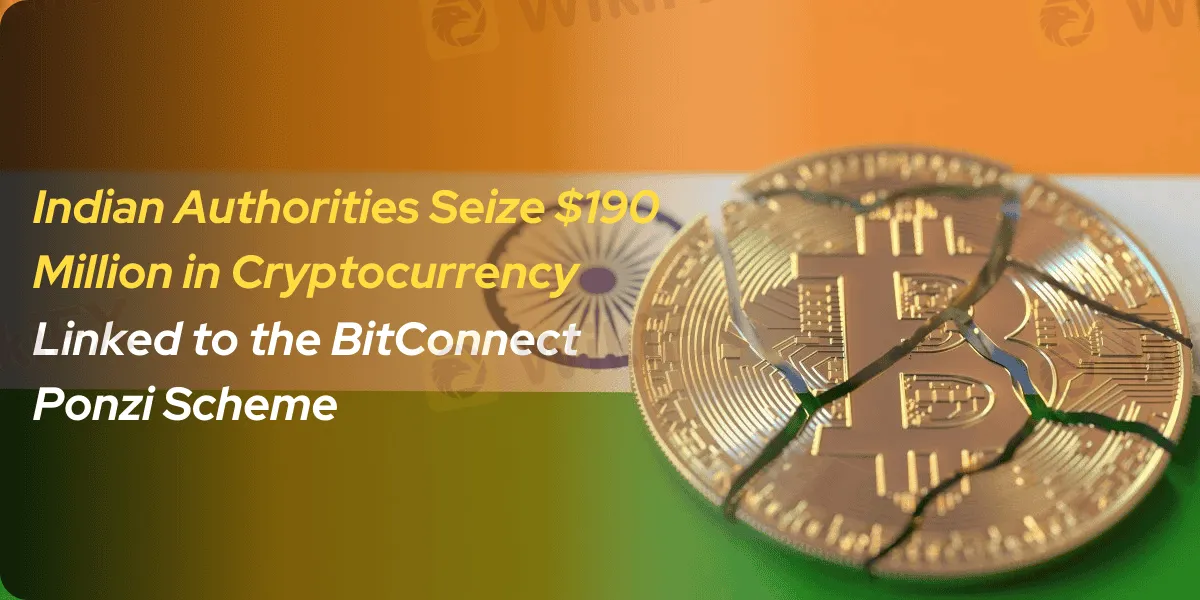Indian Authorities Seize $190 Million in Cryptocurrency Linked to the BitConnect Ponzi Scheme
Abstract:In a continuing investigation into cryptocurrency Ponzi schemes, Indian authorities have seized nearly $190 million worth of cryptocurrency associated with Bitconnect. This notorious scam, which was uncovered in 2018, caused significant financial losses for investors across 95 countries, totaling around $2.4 billion. Bitconnect, which launched in 2016, collapsed in 2018, and its founder, Satish Kumbhani, was indicted by the U.S. Department of Justice in February 2022. Kumbhani is alleged to have created a global network of promoters who were paid commissions to promote the Ponzi scheme.

The Seizure and Investigation
According to a report, the Indian Enforcement Directorate (ED) has actively pursued leads related to the Bitconnect fraud. The authorities recently seized $190 million worth of cryptocurrency as part of their investigation into the Ponzi schemes operations. These assets, which include digital currencies, cash, and a Lexus vehicle, were found in connection with the fraudulent activities linked to Bitconnect.
The investigation has expanded to include several individuals involved in the fraud. Among them is Shailesh Babulal Bhatt, a Gujarat-based man who was arrested in August last year for his role in the crime. Bhatt had invested in Bitconnect and, after the platform collapsed, resorted to extreme measures to recover his funds. He kidnapped two employees of Bitconnects founder, Satish Kumbhani, and extorted 2,091 Bitcoin, 11,000 Litecoin, and 145 million rupees, which, at the time, amounted to approximately ₹12.325 billion. Bhatt also used the extorted funds to purchase various assets, distributing around ₹2.89 billion to his accomplices.
Bitconnect and Its Global Impact
Bitconnect‘s fraudulent scheme promised investors high returns of up to 10% per day, luring thousands into the trap. It became one of the most infamous Ponzi schemes in the cryptocurrency world, relying on new investors to pay returns to earlier investors. However, when Bitconnect’s platform was shut down in January 2018, it left thousands of people facing significant financial losses. The scheme collapsed amid growing regulatory scrutiny, leading to its eventual unraveling.
Authorities in India and abroad have been investigating the scale of the fraud and are taking steps to hold those responsible accountable. Despite the seizure of assets, Kumbhani remains a wanted fugitive, and his role in the global promotion of the Ponzi scheme has drawn significant legal attention. The Indian ED has been following the money trail, using complex digital wallet networks to track down the perpetrators and recover the assets.
Legal Actions and Global Impact
The global fallout from Bitconnect‘s collapse is still ongoing, with courts in the U.S. and India actively pursuing legal action. In 2023, a California judge ordered $17 million in compensation to Bitconnect’s victims, reflecting the scale of the damage caused by the scam.
Indian authorities continue to work closely with international law enforcement agencies to dismantle the criminal networks associated with the Ponzi scheme. The complex web of transactions used to hide the true owners of the wallets holding the stolen assets has made the investigation challenging, but EDs efforts are yielding positive results.
Conclusion
The Bitconnect Ponzi scheme serves as a cautionary tale for investors in the cryptocurrency space. It highlights the risks associated with unregulated investment opportunities and the importance of conducting thorough due diligence before participating in any financial ventures. While the legal battles continue, the seizure of significant assets by Indian authorities marks a significant step forward in holding those responsible accountable and preventing future fraud in the cryptocurrency industry.
Read more

Rising Fraud in the Philippines: How BSP Circular 1140 and AI Combat Scams
Discover how the Philippines tackles rising fraud with BSP Circular 1140, AI-driven solutions, and tokenization to secure its digital economy. Learn more.

Danger Alert: Moroccan Trader Losing Money Due to GlobTFX Platform Crash!
In another incident confirming the suspicious practices of the GlobTFX platform, a trader from Morocco lost $89 while executing a financial trade due to a sudden technical failure on the platform.

No One Falls for Scams… Until They Do. Are You Next?
Scams thrive on the belief that only the naive or uninformed become victims. Many assume that intelligence, financial acumen, or sheer scepticism will shield them from fraudsters.

Turn Scammers into "SOHAI" with This Bot!
A new artificial intelligence (AI) chatbot, named Scammers on Hold AI (SOHAI), has been introduced as a countermeasure against online fraud, enabling users to deliberately waste the time of scammers who target unsuspecting victims via WhatsApp.
WikiFX Broker
Latest News
Forex Inflows Surge by 245.9%, What’s Behind This Staggering Growth?
SaracenMarkets- Safe or Scam?
How to Spot a Fake Forex Broker Before You Lose Money
AUSTRAC Shakes Up Australia’s Crypto and Money Transfer Industries
Is Binance Really for Sale? The Truth Behind the Speculation and Market Shifts
Broker Comparison: XM vs AvaTrade
FCA Flags 9 Unlicensed Financial Website: Warning on Investor Risks
"I can't log in or withdraw funds"- Victim Said
Will SOLANA Survive the Meme Coin Collapse?
Cyprus Police Warn of Rising SMS Scams Targeting Binance Crypto Users
Rate Calc

